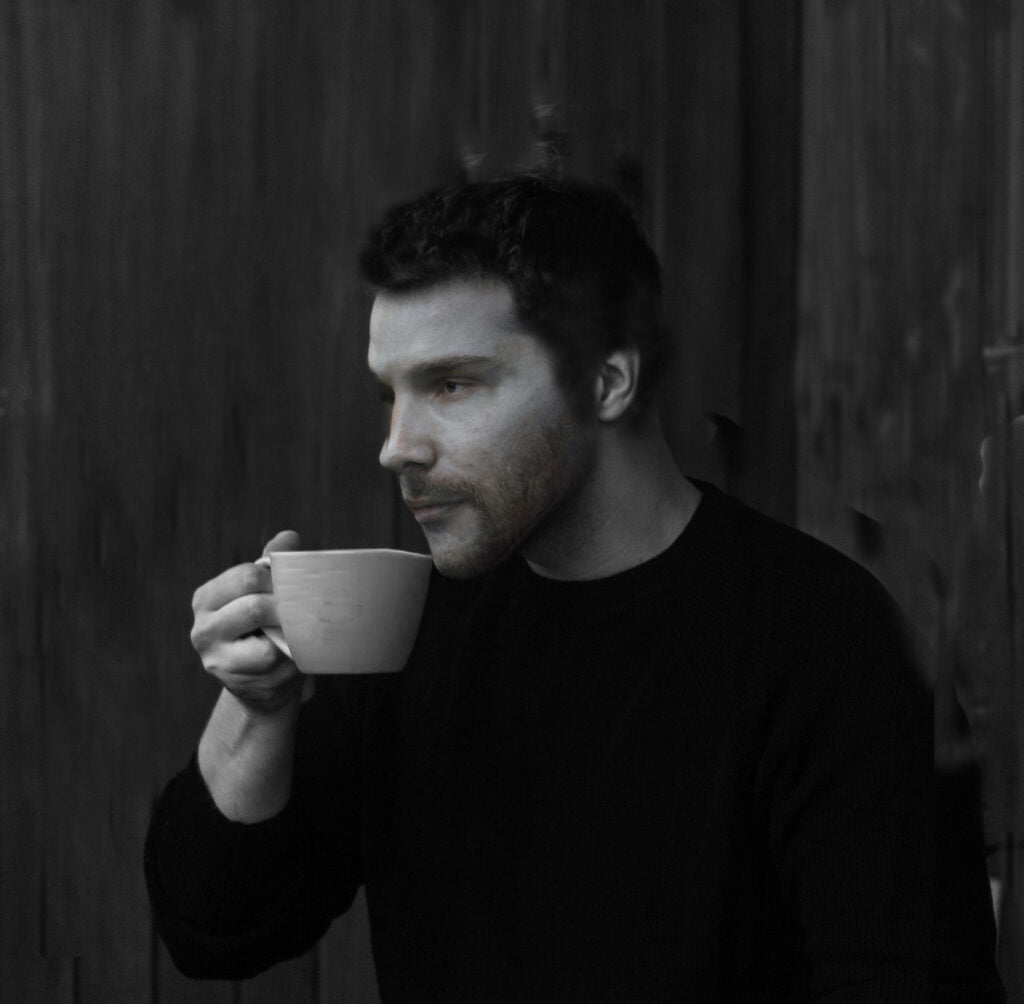Brewed black coffee can sit out for 12-24 hours at room temperature and stays good for 4-10 days in the refrigerator. While coffee with milk, like latte, only lasts 2 hours at room temperature and 2 days refrigerated. But honestly, coffee is always best fresh and hot.
Coffee is a daily ritual for many, but questions often arise about its shelf life and safety. Can you drink expired coffee? How long can it sit out before it becomes unsafe? This comprehensive guide addresses these concerns, providing clear answers and practical tips to ensure your coffee remains enjoyable and safe.
Can you drink expired coffee?
Yes, you can drink expired coffee, but with some caveats. The term “expired” typically refers to the “best by” date, which indicates the peak freshness rather than the safety of the product. Coffee doesn’t spoil like perishable foods, but it does lose flavor and aroma over time. If stored properly, coffee that’s past its peak is usually not a health risk and rarely causes foodborne illness like diarrhea.
When the coffee exhibits signs of spoilage, such as mold, an off smell, or an unusual taste, it’s best to discard it. Consuming spoiled coffee can lead to an upset stomach or other mild health issues.
How long can coffee sit out?
The duration coffee can safely sit out depends on its type and whether it contains milk or other additives.
Brewed Black Coffee
Black coffee can stay drinkable at room temperature for up to 12–24 hours without going bad. However, its flavor starts to degrade just 30 minutes after brewing. It’s best to drink black coffee soon after brewing or store it properly in a thermos flask.
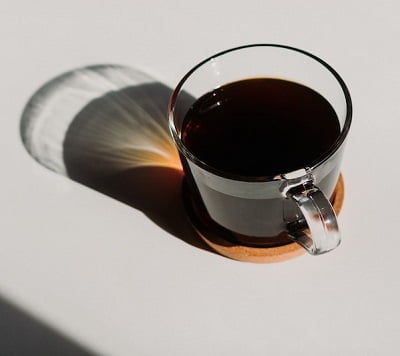
Cold Brew Coffee
Cold brew is more stable than regular coffee due to its lower acidity and slower oxidation. You can leave it out at room temperature for 1-2 days without it losing too much flavor. If you want to keep it fresh longer, just pop it in the fridge and try to finish it within a week.
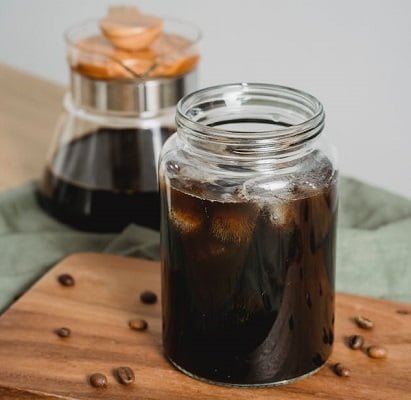
Coffee with Milk
Coffee containing milk or creamer should not sit out for more than 2 hours. Dairy products go bad pretty quickly if left out, which means they can get risky in terms of bacteria. If you’re not drinking your coffee with milk right away, just pop it in the fridge. It should be good there for about 24 to 48 hours.
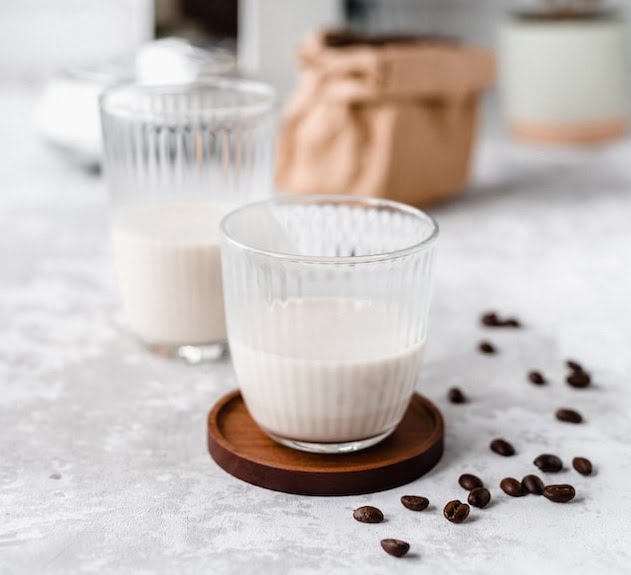
Coffee beans
Whole coffee beans stay fresh for up to six months if you keep them in an airtight container in a cool, dark place away from sunlight, heat, and moisture. For the best flavor, try to use them within that six-month window. After that, they might still be okay to brew, but they’ll probably taste a bit dull or stale.
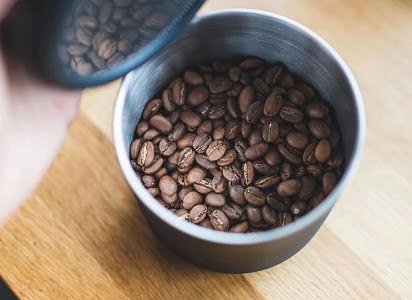
Coffee Grounds
Ground coffee goes stale a lot faster than whole beans because when you grind it, more surface area is exposed to air, which speeds up the oxidation process. Even if you keep it in a sealed container, ground coffee usually stays fresh for only about 3 to 4 weeks. After that, it can lose its aroma and flavor.
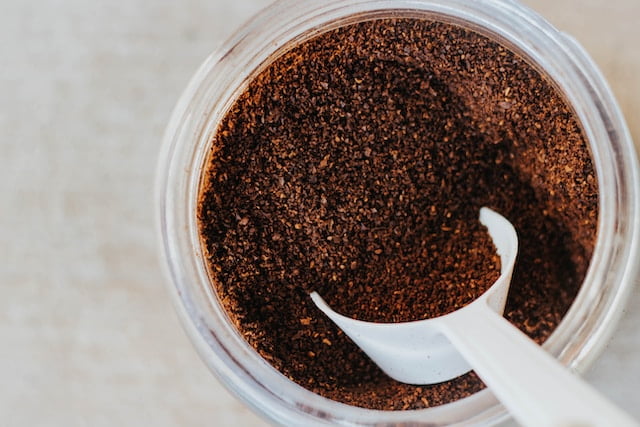
How Coffee Goes Bad?
Coffee doesn’t spoil in the same way milk or meat does, but that doesn’t mean it stays good forever. Over time, coffee loses its flavor, aroma, and quality. In some cases, it can even become unsafe to drink, especially if it’s exposed to moisture or you’ve added milk or creamer.
Let’s identify the primary reasons why coffee goes bad and learn how to recognize it.
1. Oxidation Kills The Flavor
When coffee comes into contact with air, it starts to oxidize, which breaks down its oils and aromas. First, the aroma fades away, and then the flavor turns dull, bitter, and stale, kind of like cardboard or burnt wood.
That’s why it’s super important to brew your coffee fresh and store it in airtight containers to keep its flavor intact.
Even freshly ground coffee can lose its aroma within just 15 minutes if left exposed to the air.
2. Moisture is a Mold Magnet
Moisture harms coffee by promoting the growth of mold and bacteria. It makes the grounds clump together and leaves the beans feeling damp. You might see mold as white, green, or gray spots, and if brewed coffee is left out, it can get cloudy or taste sour. Drinking moldy coffee isn’t safe.
Never store coffee near a kitchen sink, dishwasher, or anywhere with high humidity. Even storing it in the fridge without a sealed container can cause condensation, which can ruin your coffee.
3. Heat and Light
Heat can really make coffee lose its tasty oils, and light can mess with its chemistry, making it taste sour or burnt. Keeping coffee near windows or heat sources will make it lose flavor fast.
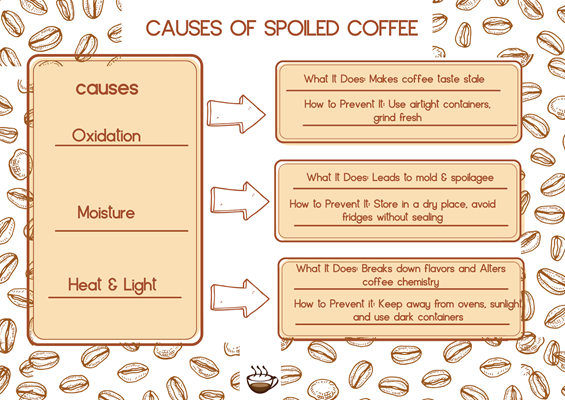
How to Store Coffee Properly to Prevent It from Going Bad?
Proper storage is key to preserving the flavor, aroma, and safety of your coffee, whether it’s brewed, ground, or in bean form. How you store it directly impacts how long it stays fresh and enjoyable.
Brewed Coffee
For brewed coffee, always transfer it to a clean, airtight container and place it in the refrigerator. Black coffee can last up to 4–10 days when stored in the fridge, while coffee with milk can last only 1–2 days.
Don’t reheat the coffee after it has been refrigerated. Just enjoy it cold by pouring it over ice or mixing it with some cold milk!
Coffee Beans or grounds
For coffee beans or grounds, keep them in airtight containers to protect them from air, light, moisture, and heat. Store the container in a cool, dark place, such as a pantry or cupboard. Don’t store it in the fridge or freezer, which can introduce moisture and odors. Whole beans stay fresh for about 6 months, while ground coffee is best used within 2-4 weeks.
Smart storage keeps your coffee tasting its best and prevents it from going bad too soon.
What are the signs that coffee has gone bad?
You don’t need to be a professional barista to know when your coffee has gone bad. Just use your senses.
Here are the most noticeable signs:
1. Smells Off or Stale
A stale or off smell is one of the earliest indicators. Fresh coffee is known for its rich and inviting aroma. But once it starts going bad, the smell changes drastically. You may notice a musty scent, a sour edge, or an odor similar to wet cardboard. If your coffee no longer smells like coffee, it’s best not to drink it.
2. Tastes Bitter or Sour
When brewed coffee loses its freshness, the flavor profile becomes unpleasant. It may taste overly bitter, acidic, or flat. The cold brew that’s been sitting out too long can even develop a vinegary tang. If the taste is off, it’s a clear sign your coffee isn’t fresh.
3. Mold Growth
Mold growth is a serious red flag. You might notice fuzzy spots on old brewed coffee left in a pot or mold inside your storage containers. Mold can also grow on damp coffee grounds. Never consume coffee if you see mold—it can carry serious health risks.
4. Texture Changes
Changes in texture also point to spoilage. Coffee grounds or beans that feel clumpy, sticky, or unusually gritty have likely absorbed moisture. This makes them prone to spoilage and mold. Always discard coffee that has changed in texture, as it won’t brew well and could affect your health.
Check Out Related Articles
FAQs
What happens if you drink bad coffee?
Drinking coffee that’s gone bad due to age is unlikely to cause serious harm, but may result in an unpleasant taste. However, if the coffee is moldy or has been contaminated, it can lead to stomach discomfort or other health issues.
Can you Reheat Leftover Coffee?
Reheating black coffee is generally safe, but it may result in a bitter taste. Coffee with milk should not be reheated if it has been sitting out for more than 2 hours, as this can increase the risk of bacterial growth.
Can you store coffee in the freezer?
Storing coffee beans in the freezer (if done properly) can prolong their shelf life by up to 1-2 years. However, it’s essential to use airtight containers to prevent the absorption of moisture and odors. Ground coffee is not recommended for freezing, as it can clump and lose flavor.
Read a guide on how long is coffee good for in the fridge?
What to do with old coffee grounds?
There are plenty of useful ways to repurpose old coffee grounds. They make an excellent natural fertilizer for plants, as they enrich the soil with nitrogen. You can also use them as a deodorizer to neutralize odors in refrigerators, shoes, or trash bins. Their coarse texture makes them ideal for scrubbing pots and pans, as well as serving as a gentle exfoliant in homemade beauty scrubs for your skin.
Can I use 2 year expired coffee?
Yes, you can safely drink 2-year-old expired coffee as long as it looks and smells good – it will just won’t taste good.

